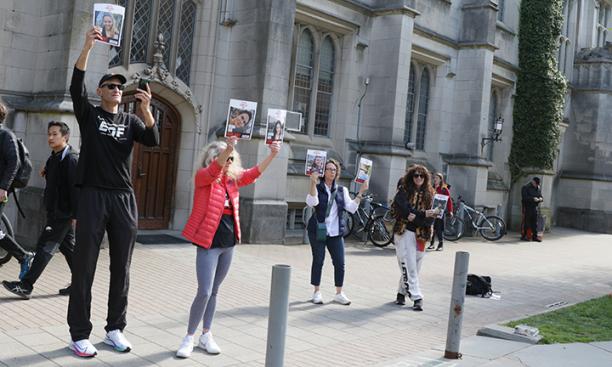
Shalom friends,
“From the river to the sea, Palestine will be free.” As hateful as I view that statement to be, it was among the least hateful things I heard and saw at the student demonstration on Princeton’s campus over the past few days. As a Princeton alumnus and local resident who has spent years in and around campus, the level of misinformation and misunderstanding within this new movement is disturbing to say the least.
My Israeli wife, Riva, organized a few people to simply stand quietly at the protest holding up pictures of the hostages. We did not speak unless spoken to, no chants, just quietly holding up the photos; it turned out to be very powerful. A few people joined us, some students said “thank you” as they passed by.
I did not feel any fear, just discomfort and deep disappointment at the portrayal of a historic and complicated conflict in a simplistic, “us or them” fashion — particularly by those purporting to be progressive. On a campus that should facilitate deep exploration of the nuances of history and conflict, this movement has instead fit the situation in Israel and Gaza into its own prescribed narrative of causes.
I got nasty looks as I held my pictures up high — of a 4-year-old Jewish boy and a 53-year-old Muslim man. For one of the first times since my days as center on Princeton’s basketball team, I welcomed the attention that my height drew. A few individuals holding a Palestinian flag tried to block me so I wouldn’t appear in the photos as I wasn’t too far from the speakers. They couldn’t raise the flag as high as I raised the pictures. They moved to their right, I moved to my left.
I wish the protesters would have spoken to me. They would have learned that two weeks earlier I attended protests in Tel Aviv, demanding the government do more to release the hostages in the context of a ceasefire and seeking new elections to oust the Netanyahu government, which I despise. They would have learned that I grieve for Palestinian deaths, due in part to Israel’s actions, but also to their own leaders in Gaza — Hamas — the murderous intolerant terrorist group that started this iteration of the conflict with unspeakable violence (including brutal murders and sexual violence) and shows little interest in stopping it to protect their own people. The protesters would have learned of my longtime and continuing support for a two-state solution.
But to them I was a Jew, a very tall one, complicit in what is being called genocide. Forget Syria, Sudan, Turkey, China, North Korea — it is only this conflict that this movement deems deserving of that label. The Princeton protesters put out a list of demands, all of which seem far removed from the real problems in the region: divestment, stopping Birthright trips, stopping Defense Department research that might benefit Israel, refraining from relationships with Israeli academic institutions and businesses. The demands are more about the act and performance of protesting than about the core issues or authentic humanitarian concern.
I’d like to learn where the protesters come out on the following: Does Israel have a right to exist, do you believe in a two-state solution, and how do we get there? If the answers are “yes,” then we should be working together to call for releasing the hostages, getting rid of Hamas, and replacing the Netanyahu government. That should be common ground for rational concerned people. Sadly, I think these protests are counterproductive in every way. They embolden Hamas to think there is support for keeping the hostages and that they might be able to get a ceasefire without releasing them. They also might back the Israeli government against a wall where they feel there is nothing to lose by going on offense in Rafah to try to destroy Hamas once and for all, despite the impact on ordinary Palestinians.
While I am not sure that most of the protesters are antisemitic, (though some clearly are), their rhetoric is intellectually weak, inaccurate, and has leapt past the line of legitimate criticism of the Israeli government’s actions to demonization of Israelis and Jews generally. Occupants of the encampment seem eager to be part of a “movement,” but I worry that continued protest with repetition of the same hateful rhetoric will move even more of the protesters toward antisemitism, making productive dialogue even more difficult. Hamas must release the hostages now. Then we need a ceasefire. The Israelis and the Palestinians need new leadership, and with the help of friendly nations, Gaza needs to be rebuilt and discussions need to begin on building a better future for the two peoples. The protests in McCosh Courtyard or Cannon Green won’t get us any closer to those goals.
Howard Levy ’85 is president and CEO of HYP and the head men’s basketball coach at Mercer County Community College.
